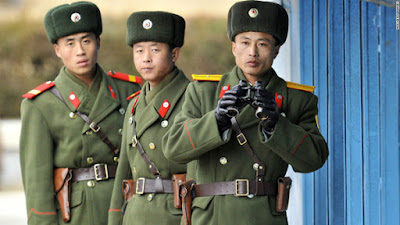North Korea have publicly executed 2 women and jailed another for life because they were fortune tellers. The trio had allegedly formed a collective named the Seven Star Group and claimed a ‘spirit oracle’ could be channelled through 2 children, aged 3 and 5, to tell the future.
A source within the country told Radio Free Asia that the execution was ordered to ‘maintain social order’ over fears fortune telling had become too widespread.
They added: ‘Even high-ranking officials and the families of judicial authorities often visit fortune tellers before arranging weddings or making business deals.’
Thousands of people reportedly attended the execution of the 2 women in Chongjin, North Hamgyong Province.
In 2013, Kim Jong-un ordered the execution of his own uncle, Jang Song-thaek, a high ranking government official, after accusing him of trying to increase his own power.
The full extent of the use of capital punishment in North Korea is not fully known, but its criminal code states the death penalty can be applied for vaguely defined offences such as ‘crimes against the state’ and ‘crimes against the people,’ according to the a report published by the UN.
It added: ‘The policy of regularly carrying out public executions serves to instill fear in the general population.’ An amendment to the law in 2007 extended the death penalty non-violent offences such as smuggling, and authorities are able to order a person’s execution if they deem the crime to be ‘extremely serious’.
North Korean defector Gim Gyu Min previously told Metro.co.uk about being forced to attend public executions from the age of 6. He said: ‘Officials would usually announce an execution was taking place about a week before it happened and notices would be put up in the neighbourhood. ‘Everyone had to attend and workers would be rounded up and brought as a group to the execution site. There would be a little stage or a clearing, with a stake in the middle where the person would be tied up with their friends and family standing closely nearby. ‘The condemned would be taken behind a curtain and have their head smashed to knock them out, so when they were tied up they wouldn’t resist. ‘Guards would then tie them up, take aim, and shoot.’
Source: metro.co.uk, Staff, April 13, 2019
⚑ | Report an error, an omission, a typo; suggest a story or a new angle to an existing story; submit a piece, a comment; recommend a resource; contact the webmaster, contact us:
deathpenaltynews@gmail.com.
Opposed to Capital Punishment? Help us keep this blog up and running! DONATE!
"One is absolutely sickened, not by the crimes that the wicked have committed,
but by the punishments that the good have inflicted." -- Oscar Wilde












